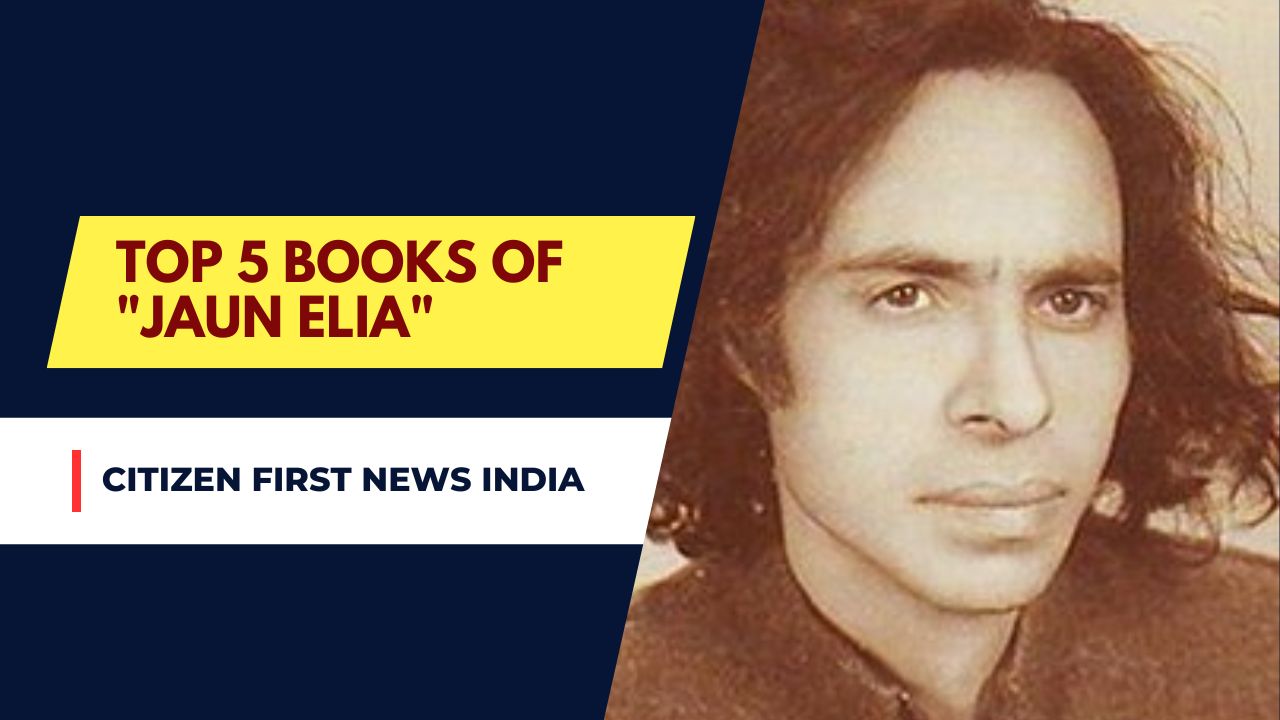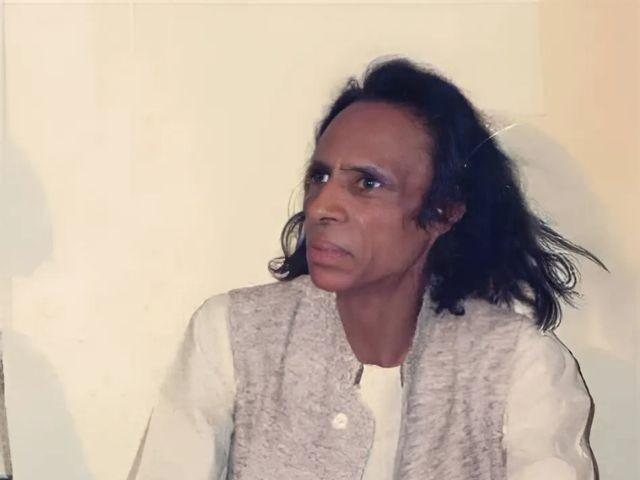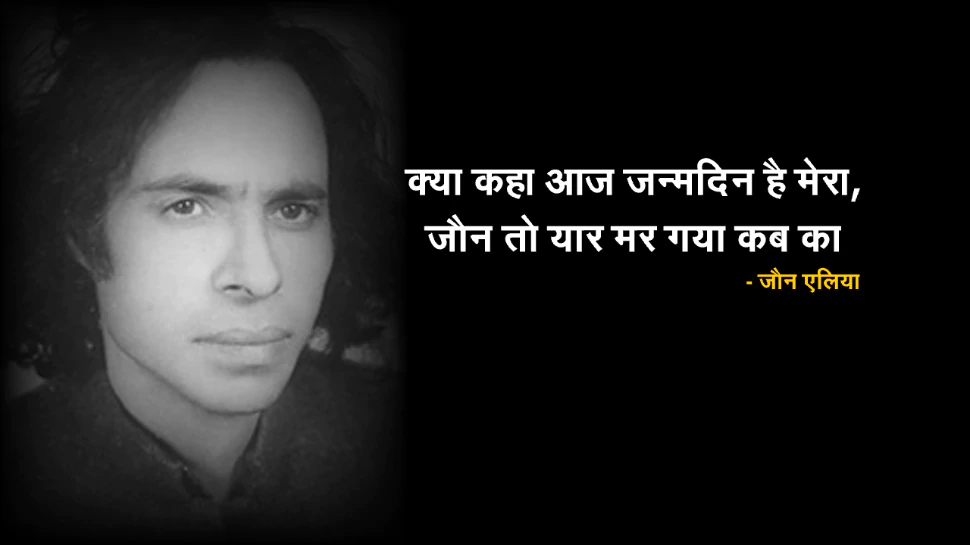
Top 5 Books of “Jaun Elia” Jaun Elia, the name that sounds music to the ears of literary lovers across the globe, was one of the most powerful and revered poets of the 20th century. His poetic approach, infused with passion, introspection, and intellectualism, has left a mark on Urdu literature that is hard to erase. Renowned for controlling language and understanding human feelings and existential questions to the core, Elia’s writings are admired for their audacity, melancholy, and philosophical depth. This article explores some of Jaun Elia’s finest and most important books, which are still fascinating readers and scholars equally.

Top 5 Books of “Jaun Elia”
- Shayad (Perhaps)
Published in 1991, Shayad is Jaun Elia’s most renowned collection of poetry. It is a reflection of his existence, with melancholic lines, philosophical thoughts, and an underlying air of hopelessness. The title itself, Shayad, means “Perhaps,” summarizing the uncertain, ephemeral nature of life that permeates the poems.
The collection contains poems that delve into themes of love, loss, despair, and the complexities of human emotions. What is different about Shayad is that Elia employs metaphors and imagery that are not typical, defying standard poetic conventions. His tone throughout this book is bleak but also one that provokes readers to consider their own personal experiences of pain and love. His utilization of the Persian language in a lot of his poems introduces an element of sophistication, raising his work to a level of intellectual refinement that deeply appeals to scholars and ordinary readers alike.
Shayad was instrumental in making Jaun Elia a contemporary poet ready to deviate from the limits of classical Urdu poetry. His foray into existential themes and his unflinching approach make this anthology a must-read for anyone following the development of Urdu literature.

- Guman (Doubt)
Guman is another important work by Jaun Elia, published in 1991, the same year as Shayad. The title Guman translates as “Doubt,” and it is representative of Elia’s enduring focus on issues of doubt, skepticism, and the human condition. Where Shayad tends to resolve into hopelessness and disillusionment, however, Guman is a more complicated and nuanced exploration of doubt, both existential and emotional.
In Jaun Elia’s poetry in Guman, the philosophical essence of doubt is explored, with the question of the nature of truth, love, and self. His lines engage the contradictions of human relationships, the ambiguity of human existence, and the contradictions in the human mind. The book is characterized by its strong emotional intensity, mental acuteness, and the capacity of Elia to express deep philosophical ideas in simple yet powerful words.
Jaun Elia’s style in Guman is unflinching and unsparing. He writes in the first person many times, presenting his thoughts in a personal, intimate manner yet making them universally appealing. The dominant theme of doubt throughout the collection serves to emphasize the slipperiness of human perception, and readers must confront the troubling questions Elia poses.
- Naqsh-e-Faryadi (The Imprint of the Lamenter)
Released in 1992, Naqsh-e-Faryadi is another of Jaun Elia’s groundbreaking works that remains revered for its intellectual depth and boldness. The name means “The Imprint of the Lamenter,” and it delves into the convergence of despair and beauty through Elia’s complex poetry. The collection has a tone of lamentation, but it also attempts to capture the beauty that lies in suffering and sorrow.
This book is a study of the existential sorrow and disillusionment that accompany human existence. Elia’s skilful application of metaphors and imagery presents a world that is as sombre as it is lovely, with contradictions that mirror the turmoil of the emotions of life. Naqsh-e-Faryadi is an invitation to readers to reflect on their own sorrow, loss, and the fleeting nature of life itself.
The collection is replete with melancholy yet deep thoughts about the condition of man. The capacity of Elia to bring together the poetic and the philosophical makes this work stand apart, and it remains one of the most loved books in the realm of Urdu literature.

- Yani (That is to Say)
Yani was released after Elia’s death, years later, in 2002, and it was among the final books to highlight his poetic talent. The book’s title, Yani, is translated as “That is to Say,” something that is an expression of Elia’s manner of articulation. The poems in Yani combine philosophical introspection with emotional vulnerability. They handle an array of topics, from the intricacies of love and heartbreak to the philosophical issues of human life.
What sets Yani apart is the manner in which Elia weaves various poetic styles and forms into one that reads experimental but nonetheless consistent. The novel also expresses Elia’s increased sense of detachment and loneliness, as the poems throughout contain an acute feeling of detachment from society at large. While so doing, however, his intelligence and humor sparkle in the pointedness of his poetry.
In so many ways, Yani is the culmination of Elia’s writing career, taking themes and motifs from his earlier works and also extending boundaries. It is a collection that is willing to go into darker corners of life, yet still discovering beauty in the process.
- Tulu-e-Ismat (Dawn of Purity)
One of Jaun Elia’s first writings was Tulu-e-Ismat, and though it is not as renowned as his subsequent writings, it remains a favorite in the hearts of his audience. “Dawn of Purity” is the name of this book, and within it, the poet frames themes involving innocence, chastity, and moral dilemmas. Although the tone in this book is relatively lighter than some of his other late works, there remains an undertone of philosophical questioning and an examination of the conflict between human needs and moral uprightness.
This anthology provides an early insight into Elia’s promise, demonstrating his developing poetic voice. His command of rhyme, rhythm, and metaphors is apparent, and even in his initial works, one can feel the richness of his intellectual and emotional terrain. Tulu-e-Ismat provides readers with a chance to observe Elia’s development as a poet and to enjoy his distinctive style of storytelling through poetry.
)
- Azad (Free)
In Azad, Jaun Elia transcends the limits of conventional love and suffering to delimit the subject of freedom in all its subtlety. Posthumously published, Azad continues to be a compelling testament to the literary genius of Elia. The name Azad, which means “Free,” resonates with the poet’s aspiration for individual freedom and emotional release from the fetters of society as well as personal self-denials. In a sequence of evocative stanzas, Elia articulates the interior and exterior sources that curtail human potential.
This is a book full of poems that convey a feeling of defiance against the world, against the self, and even against the constraints of language. It shows Jaun Elia at his most intellectually audacious, struggling with the big issues of freedom, identity, and the individual’s role in the world. Azad’s readers are led on a path of self-discovery, as Elia challenges and resists the forces that would hold him back.





I’m not sure exactly why but this web site is loading incredibly slow for me. Is anyone else having this issue or is it a problem on my end? I’ll check back later and see if the problem still exists.